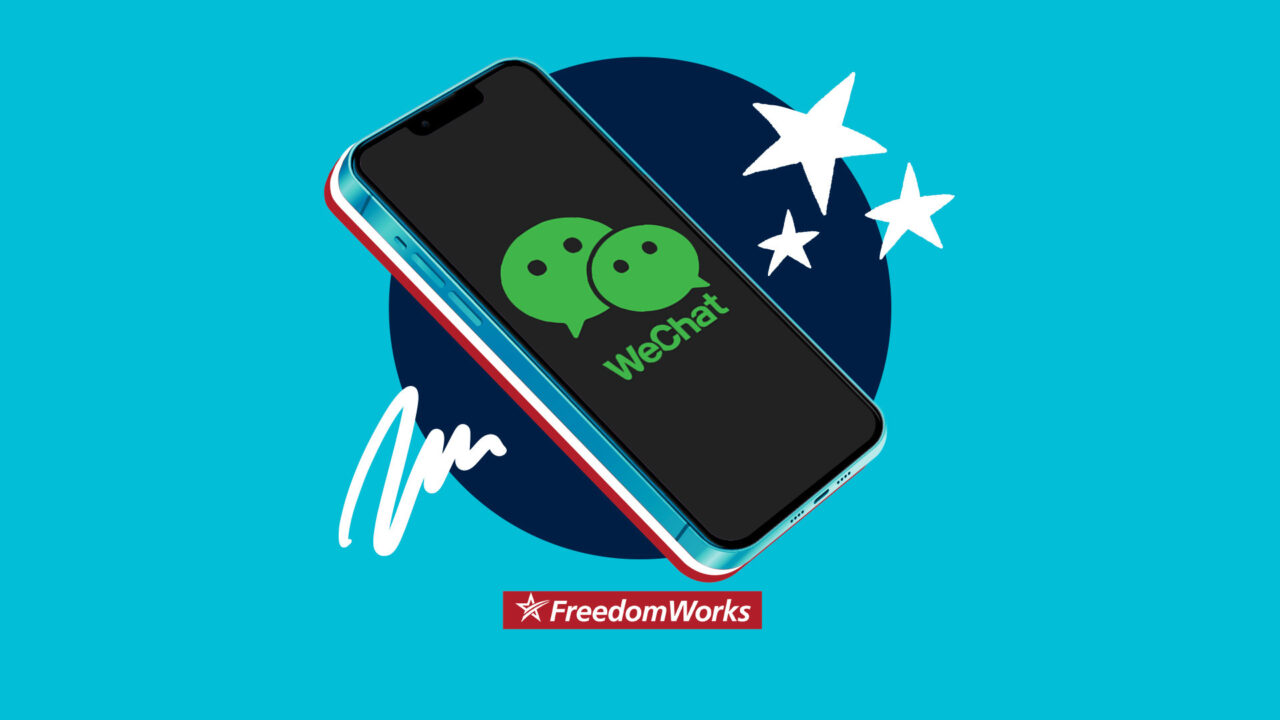Conservative Paranoia About WeChat Is Belied by Traditional Conservative Reason

As seen in RealClearMarkets.
“WeChat is the most popular communications platform in the world for Chinese speakers.” Those are the words of Johns Hopkins professor Seth Kaplan. This is important mainly because Kaplan contends that which is the “most popular communications platform” is also “a preferred vehicle for China’s Communist Party to steal data, censor, propagandize, and spread disinformation in the U.S.”
If we ignore how flattered the members of the CCP must be by the brilliance ascribed to them by paranoid members of academia, it’s useful to point out that Kaplan can’t have it both ways. Particularly someone like Kaplan who, as evidenced by the where of his opinion piece about WeChat (the editorial page of the Wall Street Journal), seemingly caucuses with the American Right. Really, since when are commercial arms of government so effective, and so skillful at meeting the needs of consumers?
At least in the past, conservatives correctly and rightly pointed out the ineptitude of service providers tied to government. Think the DMV, the Post Office, the Passport Office, the IRS, and on and on. Government can’t act like a business, period. This conservative truth is vivified by daily experience, but on the matter of China, what conservatives correctly believe goes out the window. Chinese businesses tied to government, or most notably the “Communist Chinese” government aren’t just effective, they’re “most popular.”
Again, Kaplan can’t have it both ways. Either WeChat isn’t nearly as wedded to the CCP as Kaplan contends, or it is well in bed with the CCP such that we needn’t worry. Think about it. Kaplan contends that WeChat is a vehicle for the CCP to “propagandize” and “spread disinformation,” but its present popularity is surely an ephemeral notion if government is shaping the product. We’ve seen this over and over again in the United States. Government is a lousy business partner, and utterly incompetent on the matter of meeting customer needs.
The above truth is relevant to another worry expressed by Kaplan. He contends that WeChat’s “pervasiveness means that all other Chinese-language media must use it to reach readers.” Ok, quick question: which federally owned or influenced technological app or corporation is wildly popular with Americans such that it shapes the discussion? Tick tock, tick tock.
The above question speaks yet again to why we needn’t fear WeChat. Figure that Facebook is presently spending tens of billions each year in an effort to invent the future of technology. It’s not doing this because it enjoys long-term “pervasiveness.” In which case, imagine the future outlook for WeChat. If it’s true what Kaplan says about it, the “most popular communications platform” is controlled or influenced by CCP members constrained by the known. Which means there’s no way WeChat’s owners will have the freedom to continuously reinvent the app so that it can remain popular with users whose tastes are constantly evolving. Yet again, what has Kaplan biting his nails about WeChat is what should have the academic comfortable that it won’t be terribly relevant down the line.
Kaplan believes that WeChat is “a prominent part of Beijing’s mass-surveillance network” whereby “user activity is tracked, analyzed, censored and handed over to the government,” but the latter yet again speaks to how what’s working for government will serve fewer and fewer users over time. This is true unless Kaplan honestly believes that the Chinese, seemingly for being Chinese, are not held back commercially by endless government meddling in the way that every other business in every other country in the world is.
That governments are notoriously inept at processing the information they take in similarly doesn’t seem to make Kaplan wonder. Perhaps he’s too young to remember how our well-funded CIA hadn’t a faint clue about how weak the former Soviet Union was both militarily and economically. Conversely, all it took for Cato Institute co-founder Ed Crane to see what the CIA could not was a quick visit to the Soviet Union in 1981. Hunched over, miserable people in concert with horrendously awful products (Crane recalls tissue and toilet paper that resembled tree bark) revealed that the country had no economy, and by extension, that it had no chance at all in any kind of military confrontation with the U.S.
Crane’s observation over 40 years ago should give the China paranoid of the moment pause. If the CCP is what they imagine it to be, then it should be well understood that China poses no threat. Unfree countries whose economies are controlled by government generally aren’t. Of course if the CCP isn’t what Kaplan imagines, then we similarly needn’t worry.
Most of all, the main reason we needn’t worry about what keeps Kaplan up at night has to do with what a lousy job WeChat is plainly doing when it comes to propagandizing against the U.S. At present Apple sells a fifth of its iPhones in China, Tesla 40% of its vehicles, GM sells more cars in China than it does in North America, while symbols of Americana like Nike, McDonald’s and Starbucks are everywhere one looks in the country. If the goal is to make the U.S. look bad to the Chinese people, WeChat is failing miserably.
After which we must ask about why U.S. businesses with actual skin in the game do so well in a country that Kaplan says is “communist.” Hmmm. Maybe he’s young, but memory says American businesses didn’t have anywhere close to this presence in the former Soviet Union. It makes you wonder about Kaplan’s analysis, along with this conservative’s belief that “the U.S. should ban the app.” What a CCP style suggestion.



